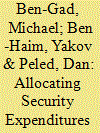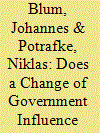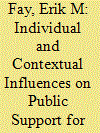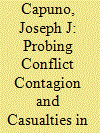|
|
|
Sort Order |
|
|
|
Items / Page
|
|
|
|
|
|
|
| Srl | Item |
| 1 |
ID:
175315


|
|
|
|
|
| Summary/Abstract |
We apply the information gap approach to resource allocation under Knightian (non-probabilistic) uncertainty in order to study how best to allocate public resources between competing defence measures. We demonstrate that when determining the level and composition of defence spending in an environment of extreme uncertainty vis-a-vis the likelihood of armed conflict and its outcomes, robust-satisficing-expected utility will usually be preferable to expected utility maximisation. Moreover, our analysis suggests that in environments with unreliable information about threats to national security and their consequences, a desire for robustness to model misspecification in the decision-making process will imply greater expenditure on certain types of defence measures at the expense of others. Our results also provide a positivist explanation of how governments seem to allocate security expenditures in practice.
|
|
|
|
|
|
|
|
|
|
|
|
|
|
|
|
| 2 |
ID:
175317


|
|
|
|
|
| Summary/Abstract |
n the last decades, Brazil has become a regional military and economic power in South America, accounting in 2017 for the largest defence budget in the region, the eleventh defence expenditure in the world, and almost 60% of South American GDP. The enactment of the National Defence Policy resulted in an increase in defence expenditure in Brazil that was primarily focused on developing and buying modern equipment and paying better salaries. The policy was implemented during three investment cycles that began with off-the-shelf acquisitions and moved to the execution of defence programmes aiming to develop indigenous technologies, substituting imports on the way. Despite the effort, we argue that the most likely scenario is that the achievement of the vision established in the National Defence Policy will be compromised, and that constant delays caused by the expenditure constraints might result in the delivery of outdated technologies and weapon systems, keeping a never-ending technological gap.
|
|
|
|
|
|
|
|
|
|
|
|
|
|
|
|
| 3 |
ID:
175316


|
|
|
|
|
| Summary/Abstract |
Arms dependency is typically framed as a security issue that states seek to avoid. Dependency creates an opportunity for an exporter to attempt to exert influence over the importer’s foreign and domestic policy. However, the arms trade is a trade and influence attempts to create economic costs for exporters by damaging relationships with current and potential customers. Thus, heavily dependent states do not necessarily need to change suppliers to avoid the threat. Additionally, as arms transfers are a signal of political support, dependency may be a sign of a mutually beneficial relationship rather than one that is potentially dangerous. This article evaluates these arguments using logistic regression models to evaluate changes in suppliers of major weapons systems. It finds that the relationship between dependence and arms transfers is more complex than previously argued where the nature of the relationship depends both on the type of exporter and the type of arm being exported.
|
|
|
|
|
|
|
|
|
|
|
|
|
|
|
|
| 4 |
ID:
175311


|
|
|
|
|
| Summary/Abstract |
We examine whether changes of government influence compliance with international agreements. We investigate compliance with the NATO two percent target to which all NATO countries committed themselves during the NATO summit in Wales in 2014. The dataset includes the military expenditure by NATO countries over the period 2010–2018. The results suggest that countries that do not (yet) comply with the two percent target have smaller growth rates in military expenditure relative to GDP when they experienced a large change of government, e.g. a change from a rightwing to a leftwing government, than countries that did not experience such a large change of government since the NATO summit in 2014. Countries that experienced a large change of government are, thus, less likely to comply with the two percent target. Future research should examine the credibility problem of national governments in other international agreements too.
|
|
|
|
|
|
|
|
|
|
|
|
|
|
|
|
| 5 |
ID:
175313


|
|
|
|
|
| Summary/Abstract |
We model simultaneous inter and within identity-group conflict in two territories connected by cross-territorial spillovers. Within each territory, two groups contest the division of a group-specific public good, and all members contest the division of group income. Each group has a cross-border affiliate. Greater success (share) of its affiliate ‘spills over’ into higher efficiency of a group in inter-group conflict. We find that inter-group and total conflict move together within a territory, while within-group conflict and output move in the opposite direction. A unilateral increase in cross-border spillover reduces inter-group conflict in the source territory but increases it in the destination; an equi-proportionate bilateral increase affects conflict in a non-monotone manner. Population increase in a territory, a larger minority, weaker property rights, higher relative labour productivity of the majority, may all increase inter-group conflict in the other territory. Community-neutral growth in labour productivity within a territory reduces inter-group conflict therein.
|
|
|
|
|
|
|
|
|
|
|
|
|
|
|
|
| 6 |
ID:
175312


|
|
|
|
|
| Summary/Abstract |
What factors at the individual and country levels influence public support for increased levels of military spending and related foreign policy preferences in NATO countries? Specifically, what individual-level characteristics (e.g., view of NATO) are associated with support for increasing military spending within the NATO alliance, and what country characteristics are associated with shifts in public opinion due to changes in the contextual environment within each country (e.g., military spending/economic growth)? Answers to these questions fill an important gap in the literature by investigating the domestic constraints that influence a country’s response to questions of ‘burden-sharing’ and free riding within NATO. This study examines how citizens’ preferences respond to their domestic political environment, and whether this behavior aligns with the ‘guns versus butter’ trade-off. Findings from a multilevel model combining country-level data with survey data from 13 NATO member countries between 2004–2012 suggest that individuals who view NATO as essential are consistently more likely to support increases in military spending, but changes in the contextual environment, such as high levels of military spending or high levels of economic growth, alter the preferences of individuals in a manner that follows what is known about the trade-offs citizens make between ‘guns versus butter.’
|
|
|
|
|
|
|
|
|
|
|
|
|
|
|
|
| 7 |
ID:
175314


|
|
|
|
|
| Summary/Abstract |
Subnational and local hostilities are regarded as a distinguishing feature of Asian conflicts. Like the violent conflicts in Indonesia, Myanmar, Sri Lanka, those in Mindanao, Philippines are noted for their persistence and enormous welfare and economic costs. Extending recent empirical studies on Asian conflicts, here we examine the importance of spatial contagion as a factor behind the local incidence of conflicts and the associated casualties in the Autonomous Region of Muslim Mindanao. Estimating negative binomial regression models on a panel of cities and municipalities for period 2011–2016, we find strong evidence of contagion: both the frequency of violent hostilities and their related casualties in a locality are affected by past conflicts, especially those related to crime, in its contiguous neighbors. No such effect is found in the placebo tests involving random neighbors in the same province, thus ruling out that the estimated contagion effects is just a correlated reaction to a common environment.
|
|
|
|
|
|
|
|
|
|
|
|
|
|
|
|
|
|
|
|
|